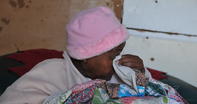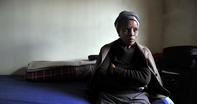Beauty Skefile

A few months after I met Victor, when I was 20, we got married. It was a white wedding and all the people in the community came, hundreds of them. It was very good. For the first 10 years of our marriage, we had enough money and we were happy. Victor bought clothes for the children and me, and supported us in every way we could wish for. I thought things would stay like that forever. But then he resigned, wanting to go back to Qunu in the Eastern Cape, where he came from.
That is where the problems started. For a while everything went well in Qunu. We lived in a house made of bricks and we ploughed our fields for mielies and pumpkins. We grew a lot of food and we were never hungry. But Victor didn't have a job anymore. Maybe that made him depressed. At any rate, that was when he started beating me.
He came home drunk and when he saw me sitting there with the kids, he asked me, rudely, 'Where is my food?' Then he started quarrelling with me, asking me questions just to pick a fight and then, every time, he hit me. He decided to marry a second woman, the wife of his brother who had died. This is a Xhosa custom, to be sure that the widows and their children are cared for.
But for me, it was unbearable. If I talked back, he hit me. There was no more love in my marriage and nothing good for me in Qunu any longer. I packed my bags. Better to struggle in Cape Town, my home, than there.
Felicia Mfamana

My husband Milton’s brothers, sisters and mother were all good people, but he was lazy and a bully. He earned money fixing up other people's houses, but wouldn't give me a cent. My mother-in-law knew what he was like and did not approve at all. She gave me food and money for the children.
Nomanani, our first child was born, then Noxolo, Nonkosi and Phumla, and still Milton did nothing to provide for us. He drank a lot and would come home at midnight, waking us all up and asking loudly, 'What are you doing asleep? Where is my food?' The first time he hit was me was when our second child, Noxolo, was a baby. Nine years later, I left him.
He had been away all day and all night and at about midnight, as usual, he came knocking at my door. 'I'm hungry. Where's my food?' he demanded. 'There's no food because you didn't give me money to buy any,' I said. 'Don't lie to me. You sell sweets and you've got money,' he said. 'That money is for feeding the children,' I replied. 'It's not your money.' He started hitting me and would not stop. He hit me in the face and when I was down on the floor, he started kicking me.
'I am going to kill you,' he shouted. My sister Neliswa was living with us. She started crying and shouting, and tried to come between us to push him away. 'No, kill me first,' she shouted at him. 'Kill me before you kill my sister.' Our neighbour heard all the noise and came running. 'Stop it! This is your wife!' he shouted, pulling Milton off me. He called the police. They didn't come, but Milton, in his drunkenness, quietened down. The next morning, I left.
By Jo-Anne Smetherham